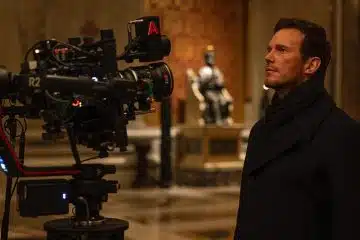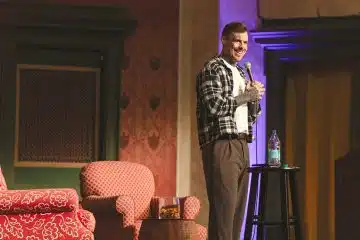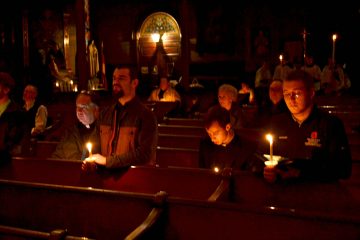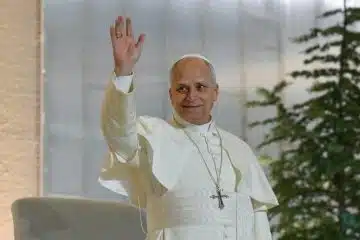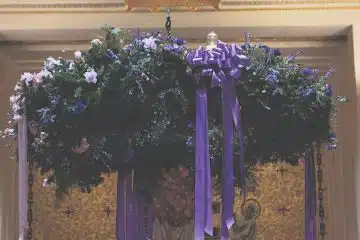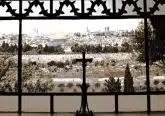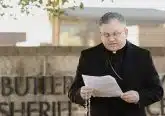Retired Auxiliary Bishop Carl K. Moeddel dies at 71
Tuesday, August 25, 2009
Staff report
ARCHDIOCESE — Bishop Carl K. Moeddel, retired auxiliary bishop of the Archdiocese of Cincinnati, died in the early hours of Aug. 25 after a long illness. He was 71 years old.
“Bishop Moeddel was a man of deep dedication and many talents,” said Archbishop Daniel E. Pilarczyk. “He served in a vast number of leadership positions over the years in the archdiocese and he served well.
“During the last few years he was afflicted with poor health, an affliction which he bore with Christian patience,” the archbishop added.
“He loved the Lord. He loved the church. He loved the Archdiocese of Cincinnati. His life and ministry were a great gift to all of us. We pray for the repose of his soul.”
 |
| The bishop-elect with his St. James parish staff following news of his appointment as auxiliary bishop in 1993. (CT file photo) |
Ordained a bishop on Aug. 24, 1993 — 16 years and one day before his death — Bishop Moeddel was at various times a pastor, vicar general for the archdiocese, director of finance, director of the Department of Pastoral Services and director of the Office of Priests’ Personnel, as well as auxiliary bishop to Archbishop Pilarczyk before he retired in June 2007 due to ill health. He was the 10th auxiliary bishop to serve the Archdiocese of Cincinnati.
A native of the Elmwood Place neighborhood of Cincinnati, Carl Moeddel was born Dec. 28, 1937. He attended the former St. Aloysius School before entering St. Gregory’s Seminary, having been influenced, he once said, by an uncle who was a Franciscan priest, as well as the associate pastors in his childhood parish.
Father David Robisch, who met Bishop Moeddel when they were freshman in high school at St. Gregory Seminary, was not surprised when his friend was ordained to the episcopacy.
“He was outgoing and friendly and intelligent,” Father Robisch said. “He really had the earmarks of being a leader. It was evident even in high school.”
After receiving a bachelor of arts, master of arts and master of divinity degrees from the Athenaeum of Ohio / Mount St. Mary’s Seminary, he was ordained to the priesthood on Aug. 15, 1962, by then-Archbishop Karl J. Alter.
His ordination on the Feast of the Assumption “has an influence on my priesthood and on my life,” he once told The Catholic Telegraph. “I was ordained on a feast of the Blessed Mother. I dedicated my priesthood to her, and I’m walking with her in my priesthood.”
In the 1960s and 1970s he held a number of positions of responsibility within the Archdiocese of Cincinnati, including executive secretary of the Archdiocesan Commission on Ecumenical and Interfaith Relations, director of Continuing Education of Priests, assistant chancellor, assistant treasurer, assistant pastor of St. Louis Church in Cincinnati and vicar for Ecumenical and Interfaith Relations.
His interest in ecumenical affairs was piqued while working as assistant to Msgr. Ralph Asplan, archdiocesan treasurer and a pioneer in ecumenical relations.
“In the rush after Vatican II, when we had all of these new commissions, we were supposed to have a commission on ecumenism, and Msgr. Asplan was named to be secretary of that group,” Bishop Moeddel recalled. “He would go to the meetings and come back with the minutes on tape. He would give the tape to me and ask me to write the minutes. I found the discussons interesting.”
It prompted him to educate himself further on the subject, and the future bishop quickly saw that seminary training was lacking in the area of interfaith relations. He was subsequently asked to teach seminary courses on Protestant denominations and ecumenism. And by the time an archdiocesan Synod was convoked in 1971, he was an expert on the subject of interfaith relations.
“The most controversial thing we did was to mention the State of Israel in our document in 1971, and even thoigh we attached no value judgments at all — it simply asked the people to be aware of the attachment of the Jewish people to the State of Israel — we became extremely controversial,” he recalled in The Catholic Telegraph. Others saw the document as extremely innovativce, as it was the first time that the State of Israel was ever mentioned in an ecumenical document of the Catholic Church on the diocesan level.
The bishop told the paper that he did not believe the church has “gone far enough in ecumenism, and I think it comes from a real fear and misunderstanding of what ecumenism is.” But he often noted that Catholics needed to better educate themselves about their own faith so they could talk about it with others.
He was the first president of the Ohio Council of Churches and president of the Metropolitan Area Religious Coalition of Churches in Cincinnati.
Bishop Moeddel was appointed pastor of the Cathedral of St. Peter in Chains in 1976. He was appointed director of finance for the archdiocese in 1978, and vicar for finance and chairman of the Finance Council of the Archdiocese in 1983. He became pastor of St. James of the Valley Parish in Wyoming in 1985, remaining as vicar of finance and chairman of the Finance Council for another year.
Religious educator Jeanne Hunt worked with Bishop Moeddel for eight years when he was pastor at St. James. Working with him, she said, “was the beginning of my learning the work of the church from the master. He taught me that what we do, we do for God. You don’t expect gratitude or thanks, you do it with humility. A commitment to Jesus Christ means you are the servant.”
“It was a sad day [for St. James] when he left to become a bishop,” she remembered. “He would have been content to remain a pastor but embraced his ministry as bishop because of his love for the church and a sense of duty. He was so overwhelmed and grateful for what he was called to.”
Father Robisch noted that he believed his friend “dearly loved the parish. I think that’s where he always wanted to be, but he was a faithful and obedient priest. He did what he was asked to do by his bishop, and certainly he used his talents to the fullest wherever he was asked to go.”
Father Larry Tharp, pastor of Sacred Heart Parish in Fairfield, worked closely with Bishop Moeddel when the latter was archdiocesan finance director.
“He was both a mentor and a friend. He was one of the finest priests I’ve ever known and one of the finest men I’ve ever known. You knew he cared about you,” he told The Catholic Telegraph.
“That’s what made him so pastoral. He could spice things up with a sense of humor that was extraordinary. It was hard for anybody not to like him, not to be endeared to him. He was just that kind and humble of a man. When he would come to do confirmations, the kids would just gravitate toward him. He was the epitome of a good priest. He would let Christ shine through what he did.”
When then-Father Moeddel was ordained a bishop, he became vicar general and director of pastoral services for he archdiocese, which at the time included oversight of the offices of evangelization, campus ministry, African-American Catholic ministry, family life, missions, Hispanic Catholic ministry, worship and youth ministry.
In addition, over the years he served as chairman of the board of trustees of St. Margaret Hall and chairman of the governing board of St. Rita School for the Deaf.
Within the U.S. Conference of Catholic Bishops, he was a member of the Committee on Marriage and Family and was a speaker at a 2001 USCCB symposium on leadership for ministry with Catholic men. He was one of the primary authors of the USCCB’s 1997 document Always Our Children: A Pastoral Response to Parents of Homosexual Children.
In March of 2005 Bishop Moeddel suffered a stroke just two weeks after undergoing heart bypass surgery. Following recovery and rehabilitation, he returned to an active schedule.
A year later, he spoke at a gathering at the Cathedral of St. Peter in Chains that pushed for just immigration reform. He reminded those present that Cincinnati was established and empowered by immigrants who were escaping “oppression, poverty and the absence of freedom in their own countries.”
“They came seeking opportunity to live a decent life, raise families and build the American dream. Today, immigrants continue to escape hopeless conditions in their own countries, and our concern for them has not changed,” he said.
The bishop asked rally participants to contact their representatives in Congress and call on them to create a system that includes an opportunity for illegal immigrants currently working in the U.S. to become legal residents and eventually citizens.
In June 2007, Pope Benedict XVI accepted Bishop Moeddel’s resignation for health reasons. Doctors had diagnosed the bishop as suffering from vascular dementia connected with the strokes he had suffered, as well as his diabetes. At that time, he moved from his longtime residence at Mount St. Mary’s Seminary to Mercy Franciscan Terrace.
When Hunt, a second cousin to Bishop Moeddel, was studying for her master’s degree at the Athenaeum, he assisted her with a paper on purgatory. When he was suffering these last few years, he remembered the paper and told her, “Purgatory exists, and I’m in it.”
“His suffering these last few years was profound, but he suffered patiently and silently. He knew it was part of the circle of life,” she said. Hunt recalled giving a talk at his nursing home last fall and, to her surprise Bishop Moeddel came into the room. She realized what a tremendous effort he made to be there, because it was almost impossible for him to walk at that point.
He gave her a big hug and kiss and said, “I came down here just for you.”
The reception of Bishop Moeddel’s body will take place from 6:30-9 p.m. Friday, Aug. 28, at the Cathedral of St. Peter in Chains in downtown Cincinnati.
Visitation will be held Saturday, Aug. 29, at the cathedral from 9 a.m. until the Mass of Christian Burial begins at 11 a.m. Archbishop Daniel E. Pilarczyk will preside at the funeral.
Interment will follow at Gate of Heaven Cemetery in Montgomery.


